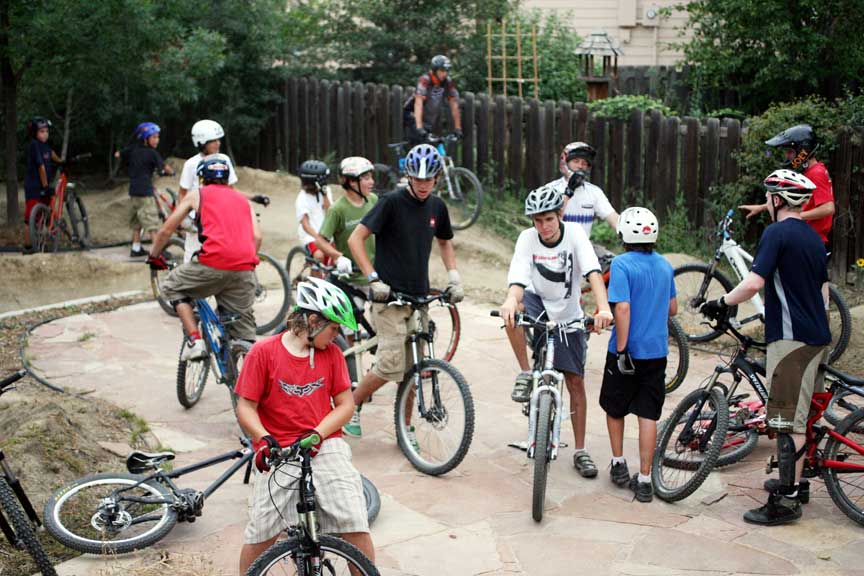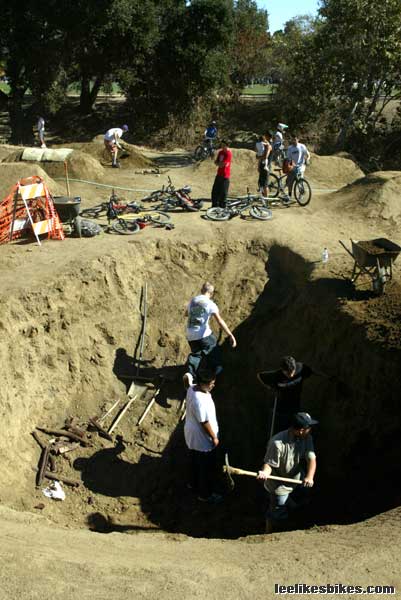Backyard dirt jump liability

Hey Lee,
I have a set of jumps that I built on my parents land behind their house. I built the jumps so that I could share them with the local kids and riders, who I have met riding my local skatepark. I am trying to promote and build a positive bike scene. The jumps are beginning to get popular and my parents have expressed concern about someone getting hurt. I know you are not a lawyer, but I need to know how I can protect my parents and myself from any lawsuits.
Also thanks for the advice on a DJ bike (20 vs 24 vs 26 for BMX riding) that I wrote to you about, I have the 09 Fit cruiser complete on order
Chris
 Calabasas dirt jumps in San Jose, CA, 2004. This craziness did not follow industry best practices (see Are your dirt jumps safety certified?). A kid got hurt soon after this, and the park was closed. Calabasas has since been rebuilt and re-opened as an official municipal dirt jump park. |
Hey Chris,
This is a tough one.
Disclaimer: I am not a lawyer. For actual legal advice, consult one of those guys.
OK, here are some thoughts:
Reality: If someone wants to sue you, they will sue you. It doesn’t matter what they signed or how nice they were before Junior got hurt. They can file a suit. Even if your state laws don’t let the suit go far, the ordeal will be stressful.
Quality: I got this from an actual lawyer, because I do a fair amount of track design. When a city installs a playground, they must follow “industry best practices,” meaning the swing set is as safe as it can be — at least as safe as the industry deems necessary.
These standards don’t exist widely for dirt jumps and pump tracks (I am working to change that), but you should design the jumps as safe as you can. When you’re in court because Johnny clipped a steep landing mound, you’ll need to justify the way you built it. “Uh, I dunno …” will cost you a lot of money.
This is another reason pump tracks are so great. They are made for safety, and you can say you followed the guidelines in the ebook Welcome to Pump track Nation, which is currently as close to industry standard as you can get. (BTW: I have a draft of a dirt jump book, with detailed standards for dirt jumps, but that’s on the bottom of the to-do pile.)
Attractive nuisance: This is also from the lawyer. Basically, if your dirt jumps are out there for all to see, and they are easy for anyone to access, you are responsible for whatever happens. It’s like the city leaving a huge, unmarked hole in the middle of a road. You don’t see them doing that, do you? Your jumps should ideally be hidden, and their access should be restricted. A chain and sign will go a long way in explaining yourself in court — and they might keep out the riff-raff.
 Junior Pump Track Worlds at my old house. 2006. These guys were on The Fix Junior Racing Team, and their parents signed waivers. |
Signs: More and more cities are building dirt jump parks — which is awesome! They all have signs like you’d find at a skate park or public pool.
These signs outline all possible risks and stipulate that, by participating in the activity, you are accepting all risks. This sign should be situated so every rider must pass it and see it. At Lory State Park, we worked the warning sign into the turnstile.
Waivers: If you encounter a vengeful parent, a waiver is worth as much as the paper and printer ink, but waivers do a great job of establishing expectations and filtering out people who are least likely to accept responsibility.
Definitely have every adult and parent sign a waiver, and keep them all on file. When Mark Weir built his pump track, he had a lawyer craft a waiver, all kids must have their parents sign it. Welcome to Pump track Nation contains a waiver. That’s a lot of value for 10 bucks. Use it!!!
Insurance: It is very hard to insure private dirt jumps. The best option I can think of is to form an IMBA club — everyone who signs the waiver becomes a member. McKay Insurance insures IMBA clubs. I talked to him, and he seemed very cool.
Charge: Charging money will help defray costs, and it will keep the ridership to a committed minimum, but that isn’t exactly spreading the love.
I totally admire your intentions here, but providing a free-for-all at your parents’ house is asking for trouble. You can take this as far as you want, but I suggest at least:
1. Make sure the jumps/pumps are built safe.
2. Restrict access.
3. Use a waiver.
This advise is worth as much as the electrons zooming around your computer screen.
Have fun and keep spreading the love!
— Lee

Comments are closed.